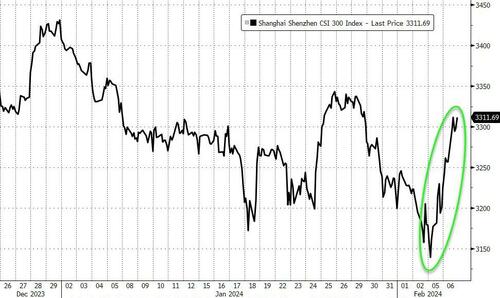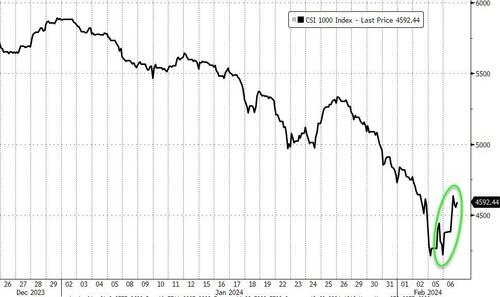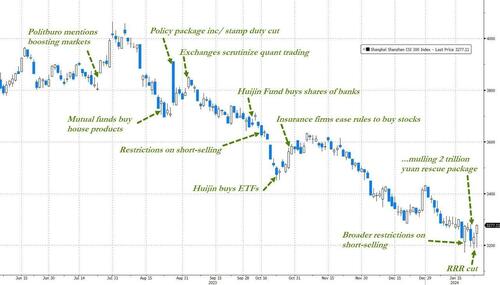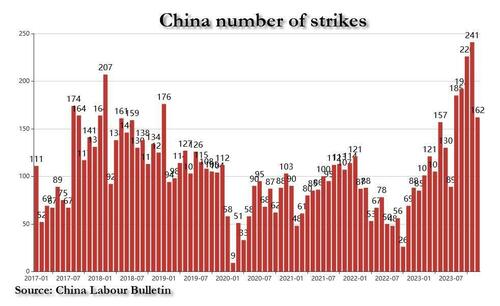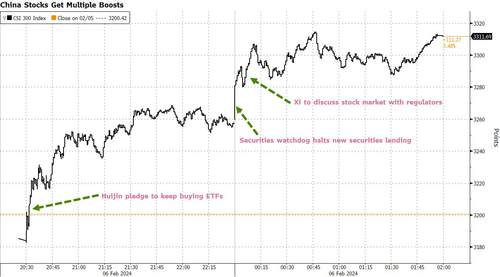
After tumbling the prior day following remarks on heavy tariffs from presidential front-runner Donald Trump, Chinese stocks rallied significantly across the board overnight after reports that regulators planned to brief President Xi Jinping on the financial market as soon as Tuesday.
The Xi-Briefing was the final headline in a day full of jawboning which included sovereign fund Central Huijin (translation: the plunge protectors) vowing to buy more ETFs, and China’s securities watchdog vowing to 'guide' (translation: coerce) institutional investors and funds to increase their A-share holdings.
“Huijin’s purchase will guide and encourage more funds to buy and also confirms the market speculation on more state buying recently,” said Zhou Nan, investment director at Long Hui Fund Management.
“There’s very limited room for further slide, but the market may continue to fluctuate before the bottom can be solidified,” he said.
It worked, as it tends to temporarily, with the CSI 300 surging 3.5% (its best day since late 2022)...
For context, that lifts the broad index to one-week highs...
While that all sounds very impressive, in context it is a fart in a hurricane (here is the small cap CSI 1000's 7% surge)...
But of course, there's always the risk that they fail to actually 'do' anything and we fade back to news lows as has been the case again and again over the last year.
Some $7 trillion of value has been wiped off Hong Kong and China equities since their peaks in 2021 and piecemeal approaches to support the economy and stabilize markets have so far failed to lift sentiment.
Most importantly, as we noted previously, the lack of stimulus (amid China's real estate sector crisis and escalating tensions with Washington on trade) has had a very adverse impact on both economic and market sentiment at a time when China's middle class is growing increasingly restless and pitchforky, resulting in a surge in labor strikes and (mostly peaceful) protests.
And while a quiet, painless sovereign suicide may be an option for Japan - with its demographic disaster and rapidly aging population where more adult than baby diapers have been sold for years; for China - which still has a young, vibrant and increasingly angry population - this is not an option as the coming tidal wave of unrest could easily result in the one thing the Chinese Communist Party dreads the most, a revolution.
However, despite the modest reaction, Xi's involvement means it's different this time as some are wondering if this is the last 'verbal bazooka' before they are forced to actually do something.
“The news that the nation’s number one is holding a meeting is an encouraging development as it shows that the plunge is getting close to punching through the authorities’ comfort level,” said Li Weiqing, fund manager at JH Investment Management Co.
“It gives me the impression that they are doing everything they can, apart from calling out to the market — now is the time to buy.”
How much longer can Beijing wait?
After tumbling the prior day following remarks on heavy tariffs from presidential front-runner Donald Trump, Chinese stocks rallied significantly across the board overnight after reports that regulators planned to brief President Xi Jinping on the financial market as soon as Tuesday.
The Xi-Briefing was the final headline in a day full of jawboning which included sovereign fund Central Huijin (translation: the plunge protectors) vowing to buy more ETFs, and China’s securities watchdog vowing to ‘guide’ (translation: coerce) institutional investors and funds to increase their A-share holdings.
“Huijin’s purchase will guide and encourage more funds to buy and also confirms the market speculation on more state buying recently,” said Zhou Nan, investment director at Long Hui Fund Management.
“There’s very limited room for further slide, but the market may continue to fluctuate before the bottom can be solidified,” he said.
It worked, as it tends to temporarily, with the CSI 300 surging 3.5% (its best day since late 2022)…
For context, that lifts the broad index to one-week highs…
While that all sounds very impressive, in context it is a fart in a hurricane (here is the small cap CSI 1000’s 7% surge)…
But of course, there’s always the risk that they fail to actually ‘do’ anything and we fade back to news lows as has been the case again and again over the last year.
Some $7 trillion of value has been wiped off Hong Kong and China equities since their peaks in 2021 and piecemeal approaches to support the economy and stabilize markets have so far failed to lift sentiment.
Most importantly, as we noted previously, the lack of stimulus (amid China’s real estate sector crisis and escalating tensions with Washington on trade) has had a very adverse impact on both economic and market sentiment at a time when China’s middle class is growing increasingly restless and pitchforky, resulting in a surge in labor strikes and (mostly peaceful) protests.
And while a quiet, painless sovereign suicide may be an option for Japan – with its demographic disaster and rapidly aging population where more adult than baby diapers have been sold for years; for China – which still has a young, vibrant and increasingly angry population – this is not an option as the coming tidal wave of unrest could easily result in the one thing the Chinese Communist Party dreads the most, a revolution.
However, despite the modest reaction, Xi’s involvement means it’s different this time as some are wondering if this is the last ‘verbal bazooka’ before they are forced to actually do something.
“The news that the nation’s number one is holding a meeting is an encouraging development as it shows that the plunge is getting close to punching through the authorities’ comfort level,” said Li Weiqing, fund manager at JH Investment Management Co.
“It gives me the impression that they are doing everything they can, apart from calling out to the market — now is the time to buy.”
How much longer can Beijing wait?
Loading…
